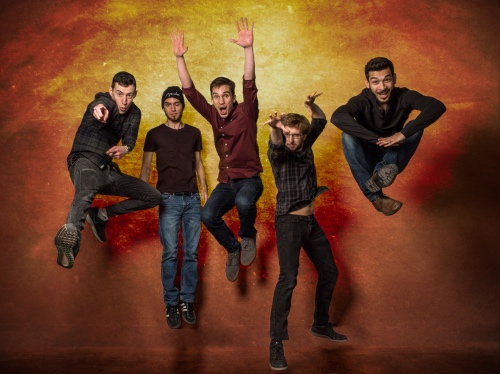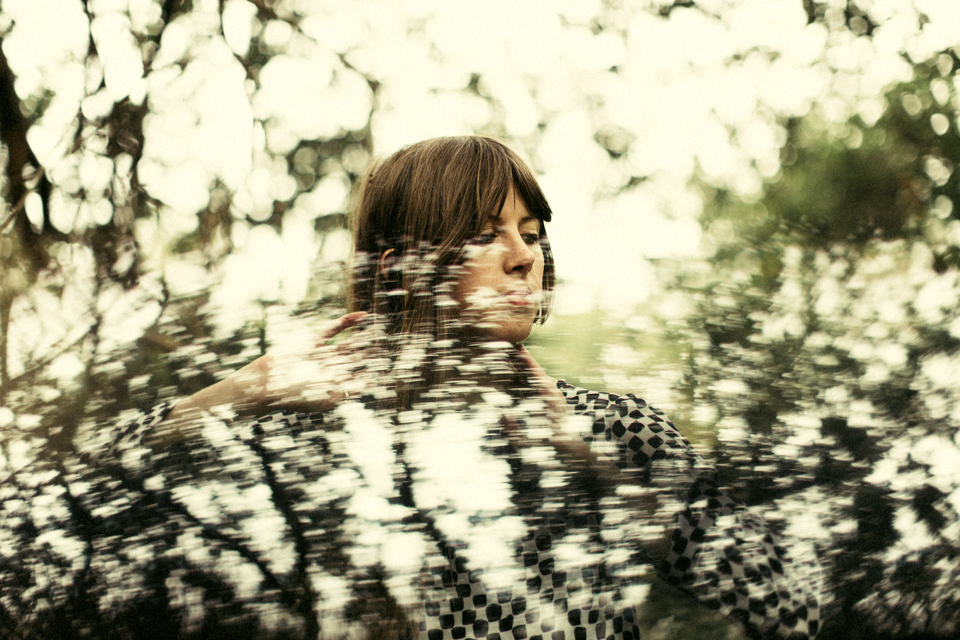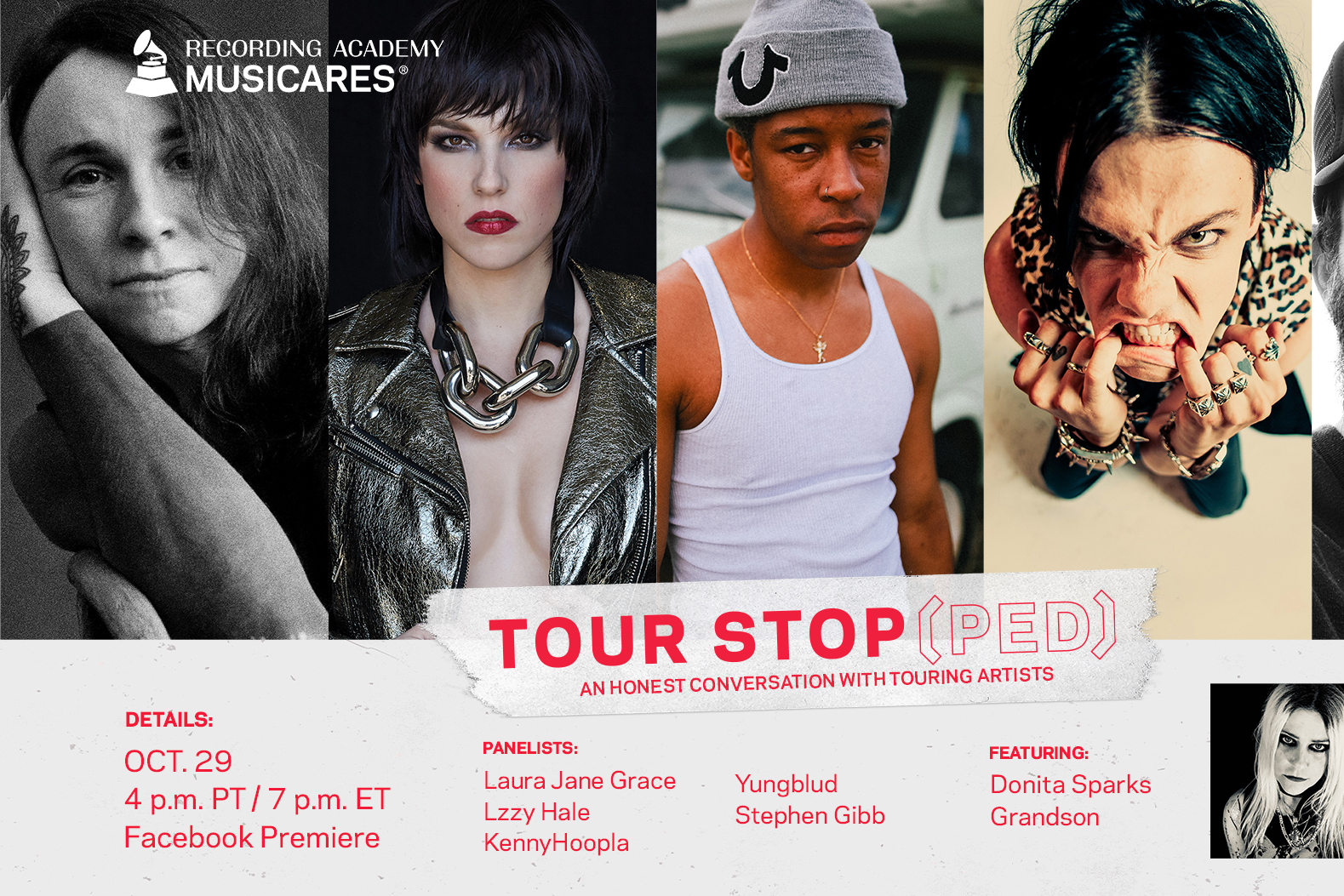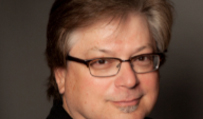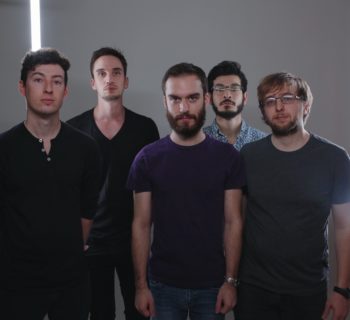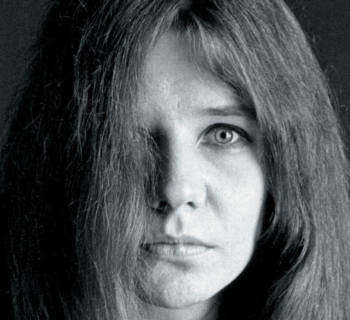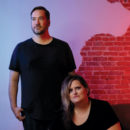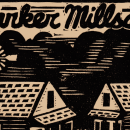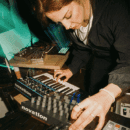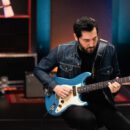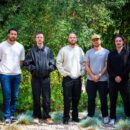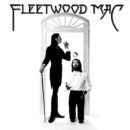Formed in 2016, Arch Echo, co-founded by Berklee College of Music graduates Adam Bentley, Joey Izzo and Adam Rafowitz entered the progressive metal/fusion scene with a debut self-titled album that gained worldwide attention, housing popular songs “Hip Dipper” and “Color Wheel.” Arch Echo toured North America and Europe, including a mainstage debut at the UK Tech Fest in 2018. Arch Echo then followed with an EP titled Story I.
Earlier this decade I was approached about lecturing at Berklee College of Music. They have a course The Music of Laurel Canyon about musicians who lived in the region 1964-1970. Their book store stocked my Canyon of Dreams The Magic and the music of Laurel Canyon.
I subsequently became a bit more aware of the musical students on campus especially the drummers and guitarists enrolled in their programs.
Guitar legend and vocalist George Benson has touted Arch Echo and Adam Rafowitz.
“Talk about fresh, energetic and exciting music, you have to experience Adam Rafowitz’s guitar playing. He is definitely worthy of your ears. His group ‘Arch Echo’ will knock your socks off and make you glad at the same time. Trust me!"
A movie producer tipped me off this year to Arch Echo.
I’ve just interviewed guitarist and engineer/producer Adam Bentley of the band who recently toured Japan and did live dates in Los Angeles at the Wiltern Theater and in San Francisco at the Fillmore West.
Visit www.archecho.com
Q: Tell me some biographical information. Born and raised.
A: I was born and raised in Tampa, Florida. I grew up in a very musical household thanks to my dad - he’s a guitar player and huge classic rock fan. I picked up the guitar pretty early on and learned a bunch of Beatles songs mainly. Their vast discography really fascinated me when I was little.
Q: I would imagine a lot of Beatles, Led Zeppelin and Red Hot Chili Peppers in your high school. Who did you love before college? Your first memories and exposure to music before you enrolled at Berklee College of Music.
A: Yes! I was a big fan of all of them going into high school. Before college I started to get into progressive rock and metal bands. Rush, Avenged Sevenfold, and Tool to name a few.
Q: At Berklee you studied drums or majored on drums. What might be one of the lessons you learned from drum studies, teachers, on campus clinics that you later applied to your recording and producing work? At Berklee you were honored as an outstanding student in production and engineering.
A: Yes my main instrument for school was the drums. Studying drums made me really appreciate the rhythmic aspect of music, as well as trained my rhythmic ear for recording and editing music. I did get a scholarship award for production /engineering - That was mainly due to the time and effort I put into improving at my work.
Q: Is it all about discipline and practicing?
A: Absolutely! Berklee is what you make of it. You’re surrounded by smart teachers, smart peers, and incredible musicians, but you have to focus on your weaknesses as a player and a professional and invest as many hours in self-improvement as you can or it would be like you didn’t even attend.
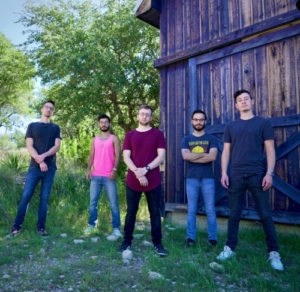
Photos: Karen L. Richard (top); Coyote Beard Productions (above)
Q: Shortly afterwards, you then became a guitar player. Why? Did you feel the guitar was the best instrument to express yourself in a band setting?
A: Guitar was always the instrument I felt expressive and uninhibited on. Not being told what to do by a teacher give me this sense of freedom and I always write music on the guitar mainly, so it made the most sense.
Q: You formed groups out of Berklee and eventually your outfit, Arch Echo. What is the origin of the band name?
A: The name has no special significance, the 5 of us were brainstorming and we landed on that because it felt natural and didn’t imply a specific genre. Band names are hard to come up with nowadays!
Q: You cited the musical influences of Jimi Hendrix, Weather Report and Allan Holdsworth. Earlier on it was Umphreys McGee and Trey Anastasio of Phish and then Al Di Meloa and John Schofield. Were they and other musicians important in the sound concept of Arch Echo being an instrumental group that could be considered in the progressive metal, jazz and fusion genre?
A: The band’s influences overall come from the 5 of us having a lot of different backgrounds musically, so that “progressive fusion” sound just happens naturally. I was more classic rock and metal-oriented while our other guitar player grew up very involved in fusion and jazz.
Q: I usually write about classic rock artists and over the last 50 years I have met and/or interviewed guitarists Jim Hall, Jimmy Page, Mick Ronson, Jeff Beck, Frank Zappa, Carlos Santana, Mike Bloomfield, Eddie Van Halen, Keith Richards, Mick Taylor, Dick Dale and John McLaughlin, who in 2017 was awarded an honorary doctorate of music from Berklee College of Music. Encountering you, I was now steered to a slew of new, younger players and guitarists like Tosin Abasi, Per Nilsen, Plini, Jakub Zyteki, Aaron Marshall, Micic, and David Maxim.
A: There is a wealth of amazing guitar-centric music nowadays. I think we’re just in an era where the internet and being able to record professional albums at home is creating this overwhelming exposure of a lot of really creative people. Guitar itself (at least in the “prog” community) is a very important instrument and it’s only growing in its influence and significance.
Q: In being introduced to Arch Echo, one aspect of the group on recordings and live is the guitar relationship you have with guitarist Adam Rafowitz. Give me some insights into the sonic bond you have with him. Drums and keyboards are an equal part in the sound dynamic of Arch Echo. I’m not discounting the other members, look at all the endorsement deals Richie Martinez has and all the compositions Joey Izzo and Joe Calderone have in television shows
A: Adam and I have become really close as friends and that is the basis for a great band relationship. Musically, He comes from a jazz fusion household in the same way I came from a rock and roll household. So us coming together with ideas creates this interesting synergy - ideas I’d never be able to write and play just by myself.
Q: Was the initial band concept to be an instrumental group no vocalists? I know you also are a songwriter.
A: Yes we wanted to express with the instruments solely, while still valuing melody and good song structure. It’s a fun challenge.
Q: You are creating complex music but trying to make it accessible. Is that a goal object?
A: That’s definitely the goal! It is what we want to hear as listeners. We like the idea of pushing what we can do on the instruments, but a song without a hook or something to remember afterward is barely a song at all if you ask me.
Q: You have suggested or subscribe to using a metronome. And that time is everything. What is your theory behind this directive?
A: Having really good internal time is more important than ever, and the more technical you want to be on your instrument, the more important that fact is. Playing and recording to a metronome really improved my timing and it’s an important tool for the whole band to lock in together without time fluctuations.
Q: I suspect every note you play with the band has purpose. But you have stated that content needs to be compelling, beyond flashy licks.
A: Yeah that touches a bit on what I stated earlier. Songs are very thought out and there isn’t any random noodling. The moments where we do come off as flashy are honestly just us having fun - it’s more for making the 5 of us react than people may realize. And I feel that comes across in our live show.
Q: You have an endorsement deal with Jackson Guitars. What do you like about their line of guitars and the model you employ?
A: I currently use the HT7 Soloist and the Juggernaut Pro Series guitars. I really like the construction and consistency. The models are really lightweight for shows and sound quite versatile sonically, which suits the band needs.
Q: Can we discuss the self-titled debut album of the band in 2016. In 2017 it was selected as 21st Century Prog and Jazz album of the year by a London radio station.

A: Our first record released May 2017, and honestly we had no expectation for how successful it would be. We were honestly blown away with the reception it received, especially since we were just a bunch of guys recording in my apartment. We did feel strongly about the songs and they were very special to us. Being held in high esteem by people definitely motivated us to write songs at a high standard on a more regular basis.
Q: Your recordings “Hip Dipper” and “Color Wheel” received radio airplay. Not to discuss every song on your album, but generally, when initiating the recording process, do you title the track first, or do the music, group or you in producing/engineering capacity decide titles?
A: Usually the song is made into a rough a demo, which is titled in a carefree way just for sake of naming it. After the song is actually recorded in its final state we decide whether or not the name is worth keeping for release. Hip Dipper was the original demo title for example.
Q: Looking back on your debut album is there one general observation or memory about the work you really feel was accomplished. Obviously you still play songs from this album.
A: The main thing looking back was how confident I felt in the 5 of us as a group, and how we were all so passionate about the outcome while still having a lot of fun recording it. It was the first time I felt like I was in a group with people so detail oriented and hard working. Fun is always the recurring word, and it’s why we still enjoy playing the older songs live.
Q: Then in 2019, was the album You Won’t Believe What Happens Next! Were you and the band going in a slightly different direction? What was a big change that emerged during the recording process?
A: It was the first record where we all collaborated in the writing process (some debut album songs were written before all 5 band members joined). There was this natural inclination to push ourselves and write something we haven’t heard before. It resulted in something more fusion and less metal. We also recorded this album remotely - we all did our own recording in our own homes.
Q: You dig the challenge of playing progressive metal. Is it partially because there are no compositional restrictions?
A: That’s absolutely why! We get to take an idea we like and run with it and it’s as simple as that. Progressive seems to be the word that describes bands like that.
Q: You have a solo album Absently. Tell me about the origin of this project. Were the tunes not for Arch Echo and geared exclusively for your solo album?
A: I wrote a bunch of songs while attending Berklee and decided to an album with them. It’s just to scratch my own compositional itch. I made another album since school, and it’s nice because I can go at my own pace and not worry about it meeting a certain expectation.
Q: Arch Echo’s videos have been important in hearing and seeing the music visually. Talk to me about your videographer. A friend from college? So well edited.
A: The first few videos are made my our friend Sam Harchik. He’s an incredible videographer with a great imagination. Instrumental music with music videos can be a difficult undertaking in regard to keeping the viewer engaged. But Sam really knocked it out of the park for us.
Q: Regarding videos, besides a promotional vehicle, do you think it subtracts from the magic of the music when there is a visual component? Although the videos I’ve seen have the band playing in them.
A: For instrumental music, if the video is really cool I think it actually adds to the experience. A good video can help immerse your mind more deeply into the song.
Q: You are extremely involved with engineering and mixing. Do you have a philosophy about mixing or some unique techniques about recording. Your concepts of producing and engineering.
A: I’d say I have a very simple engineering/mixing approach. You have a goal to achieve a certain listening experience, and you identify problems keeping you from achieving that goal. It keeps my eyes on the prize so to speak, and not get overwhelmed by things like what gear I should own and pressing a bunch of buttons just because I can.
Q: You are very active as a mix engineer and produce tutorials for some gear companies and also give tutorials to aspiring producers. What do you stress and speak to them about?
A: Most of what I teach people is to keep things simple, train your ears so you can trust them in a critical listening scenario, and always a have goal and reason for decisions you make. Regardless of the instruments or genre, that is a tried and true mindset to maintain.
Q: You’ve done some film scoring and sound design for the in progress production of Pre-Fab, the story of the pre-Beatles “Quarrymen.” Is scoring for a TV show or this project a different approach than when you are in a band doing a recording? Is it a different mindset?
A: It’s different mainly because you’re guided and influenced visually before recording your first note, so that is its own challenge. Writing for the band is a pretty blank slate which can be freeing but also overwhelming because there’s nothing anchoring you down. Writing music for PreFab is fun because you know it’s discussing a certain era in time with a certain style of music, and you can write within that framework.
Q: You have toured with Periphery, Tony MacAlpine, Plini, Vola and coheadlined a tour of Japan with Jacky Vincent. Tell me about playing in Japan.
A: All of these tours were a lot of fun in their own way! Japan was definitely a dream come true. Getting to immerse yourself into their culture and play shows for people there was incredible. Most of them barely knew English and that was awesome to me, because the instrumental music was kind of a language we both could understand. The crowds were great, the people were very kind, and the show crew were so good at what they do. I can’t wait to go back!
Q: You also did some live dates in London. Your band did a mainstage debut at the UK Tech Fest in 2018. Tell me about that gig.
A: That was our first festival as a band, and we were nervous at first. We felt pressure to deliver the best show we could, the crowd was over a thousand people easily and for us that was huge. But we had a fun show and the festival crew were really nice and helpful. A festival full of people into tech and prog music is also really cool!
Q: You did west coast shows with Periphery at the Fillmore West in San Francisco and the Wiltern Theater in Los Angeles. Further demonstrated to me there is an ever-growing audience for band performing instrumental music. Why is the live experience so essential for your band? Do the songs/recording become something different on stage?
A: We encourage anyone who has heard of us to see us live because we have so much fun playing these songs and we interact with each other a lot. I think it shows that the music can be technical and quirky but people still feel the energy, groove and accessibility to it.
Q: You are based in Nashville. Tell me about the music scene and community. You have a recording studio.
A: I do have a home studio that I work from. I don’t have to go other studios that often these days. The city is full of amazing musicians and songwriters. The nature of my work allows to have mainly remote clients that send their work by email or other methods. Before the pandemic there was no shortage of live shows - that’s a very important part of the community here.
(Harvey Kubernik is the author of 19 books, including Canyon Of Dreams: The Magic And The Music Of Laurel Canyon and Turn Up The Radio! Rock, Pop and Roll In Los Angeles 1956-1972.
Sterling/Barnes and Noble in 2018 published Harvey and Kenneth Kubernik’s The Story Of The Band: From Big Pink To The Last Waltz. For summer 2021 the duo has written a multi-narrative book on Jimi Hendrix for the publisher.
Otherworld Cottage Industries in July 2020 has published Harvey’s 508-page book, Docs That Rock, Music That Matters, featuring Kubernik interviews with D.A. Pennebaker, Chris Hegedus, Albert Maysles, Murray Lerner, Morgan Neville, Sandra Warren, Michael Lindsay-Hogg, Andrew Loog Oldham, John Ridley, Curtis Hanson, Dick Clark, Ray Manzarek, Travis Pike, Allan Arkush, and David Leaf, among others.
In 2020 Harvey served as Consultant on Laurel Canyon: A Place In Time documentary directed by Alison Ellwood which debuted in 2020 on the EPIX/MGM television channel.
Kubernik’s writings are in several book anthologies, most notably The Rolling Stone Book Of The Beats and Drinking With Bukowski.
Harvey penned a back cover book endorsement for author Michael Posner’s book on Leonard Cohen that Simon & Schuster, Canada published in October 2020, Leonard Cohen, Untold Stories: The Early Years)

